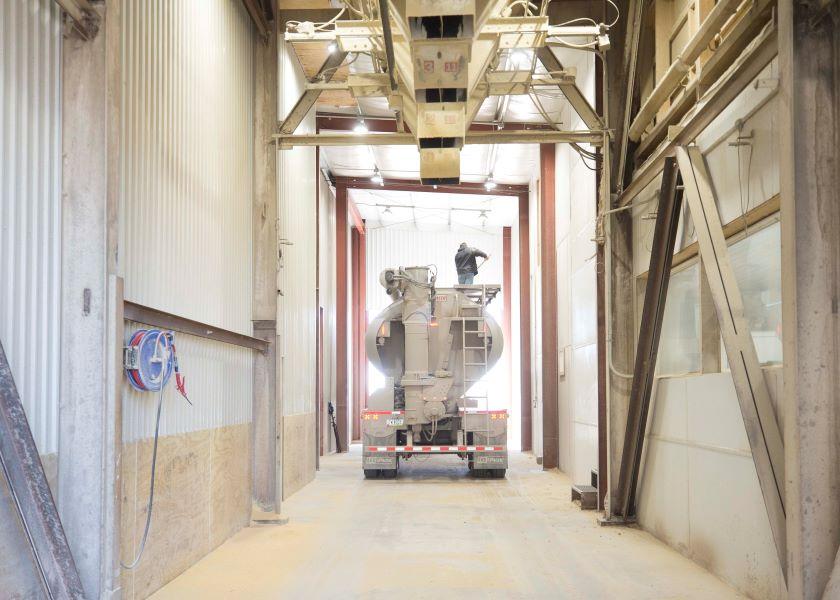New Study Investigates Feed Mill Decontamination in the Event of an ASF Outbreak

A new research study will evaluate methods for cleaning and disinfecting feed mills following a potential African swine fever (ASF) outbreak. The information gained will inform North American feed industries’ ASF preparedness plans as well as feed mill biosecurity plans to minimize supply chain and trade disruptions in the event of an outbreak.
The study is being conducted by the Institute for Feed Education and Research (IFEEDER), Animal Nutrition Association of Canada (ANAC), United Soybean Board (USB) and the Swine Health Information Center (SHIC).
“SHIC continues to look into all routes of entry and dissemination of emerging diseases, not just to identify these pathways, but to do something about them with research of this kind,” SHIC Executive Director Paul Sundberg, DVM, said in a release. “With partnership across the allied feed-related groups to benefit the U.S. swine herd, SHIC is encouraged to see this project move forward. We have learned that once ASF virus is in a feed mill, it will remain in that environment for a long time. This work is essential to address this risk to the U.S. swine herd.”
Over the course of 12-18 months, researchers will examine optimal methods for disinfecting feed mills, especially looking at feed manufacturing equipment that is not designed for disinfection. Researchers will test several disinfection and flushing procedures using three viruses known to be most stable in feed and endemic in the U.S., SHIC reports. Those viruses include Seneca Virus A (SVA), porcine epidemic diarrhea virus (PEDv) and porcine reproductive and respiratory syndrome virus (PRRSV). Researchers will also determine the infectivity of feed and environmental samples after completely flushing and decontaminating equipment.
Feed inoculation and manufacturing will occur in Kansas State University’s Cargill Feed Safety Research Center, which includes a pilot-scale feed mill with pelleting capabilities and is approved for handling biosafety level 2 pathogens, Sundberg said. The infectivity of the samples will take place at Iowa State University.
“Over the past few years, the U.S. feed industry has taken steps to improve its biosecurity procedures to reduce the risk of ASF introduction and transmission at feed mills, such as voluntarily holding ingredients for extended periods and reducing foot-traffic onsite,” Lara Moody, IFEEDER executive director, said in a release. “Now, we are looking at filling knowledge gaps within the milling process – should an outbreak occur. There are currently no recommendations for best practices to clean and disinfect a feed manufacturing facility experiencing ASF contamination. With the support of American Feed Industry Association members, we are backing this research to provide guidance to companies to quickly and safely get their operations back up and running, minimizing any long-term shutdowns, which could have detrimental food supply chain and economic consequences.”
Although ASF poses no health concerns to humans, it is a highly contagious and deadly viral disease affecting pigs and has devastated swine industries across Africa, Europe and Asia. In the summer of 2021, it was detected in the Dominican Republic and Haiti, the closest it has ever been to the U.S. mainland.
“The Canadian feed industry recognizes the devastating impact the introduction of ASF in North America would have on the swine industry,” Melissa Dumont, ANAC’s executive director, said in a release. “A strong biosecurity and supplier approval program is key to keeping animal diseases out of feed mills and these programs continue to evolve as the science evolves. However, if ASF were to be introduced in North America and enter feed mills, facilities are lacking the crucial information on how to decontaminate a feed mill. ANAC is excited to support this research project, which will provide critically important knowledge so we can adequately be prepared in the event of an outbreak and continue to provide all livestock with safe feed.”
More from Farm Journal's PORK:
Why the U.S. Pork Industry Won’t Forget 2021
Close All the Windows to Keep ASF Out
ASF in the Western Hemisphere: What’s Different 40 Years Later?
It's Time to Batten Down the Hatches, Pork Industry Experts Say
Learn more about what the industry is doing to prevent ASF from entering the country.







